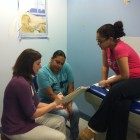Disparities
Mental Health Providers Say DSS Has Imposed Restrictive Requirements On Transgender Patients
|
A coalition of mental health providers who treat transgender people in Connecticut has complained for months that the state Department of Social Services (DSS) has imposed what they call unnecessary and overly restrictive requirements on patients seeking gender-affirming surgery. The changes affect low-income patients on the state’s Husky health insurance. Before covering genital surgery to treat gender dysphoria – the psychological distress that can result from an incongruence between one’s sex assigned at birth and their gender identity – DSS now requires proof that the person has lived for at least a year in the new gender and has come out to family and friends. DSS accepts a legal name change as proof. In March, DSS imposed a blanket denial of gender-affirming surgery for anyone under 18 and began requiring two letters from mental health professionals assessing transgender patients before some surgeries would be covered, Alexandra Solomon, a clinical social worker with a therapy practice in Glastonbury and one of the leaders of the coalition, said.




